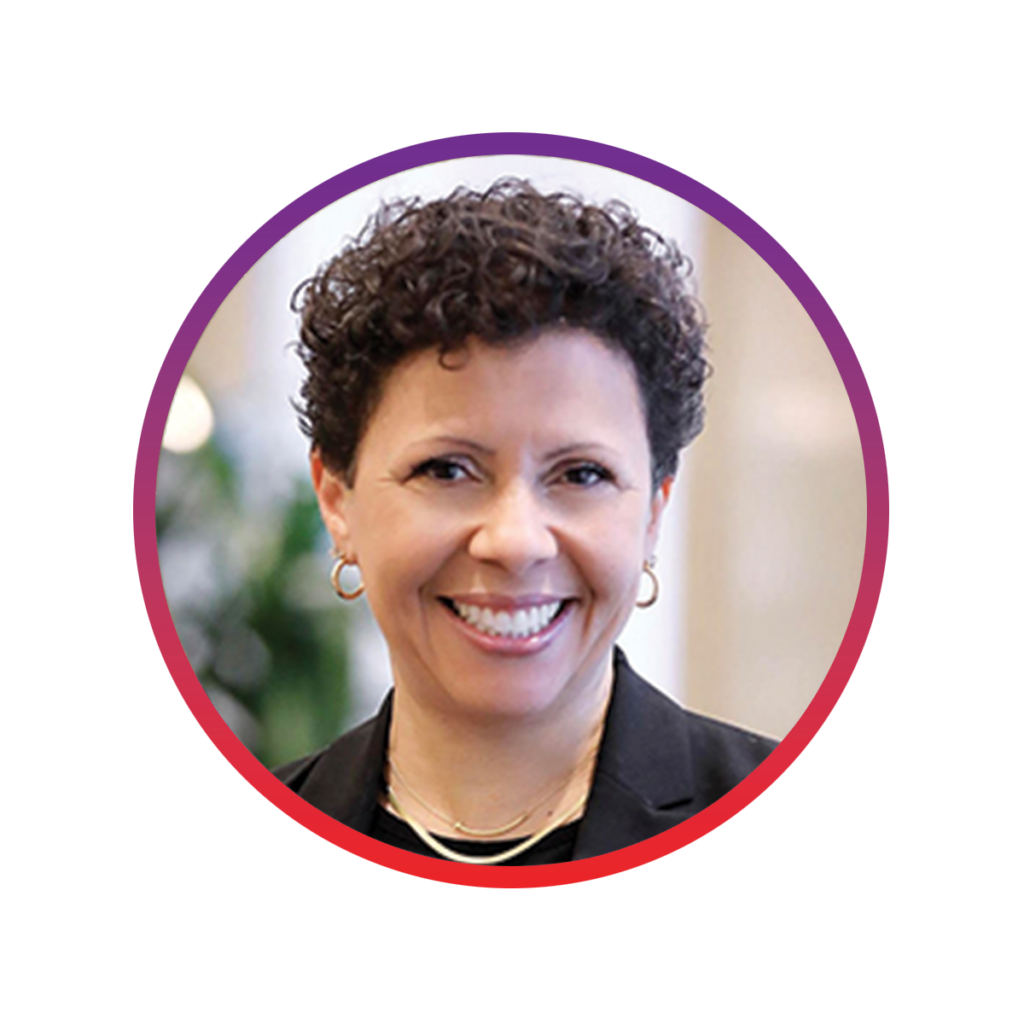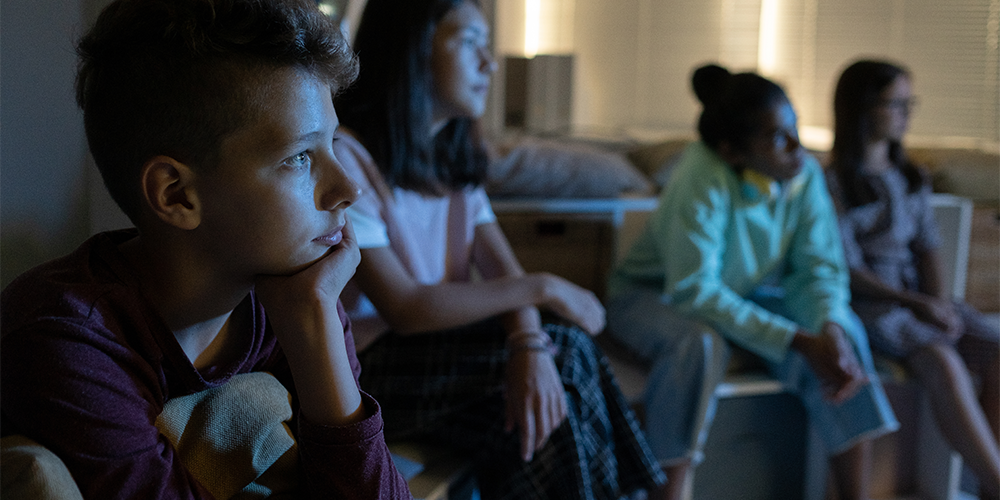In episode 73 of Teaching Channel Talks, we were joined by Scilla Andreen, accomplished film director and CEO of iMPACTFUL to discuss the impact her films Angst, Like, Race to be Human, and The Upstanders have had in schools and organizations across the country. address the destigmatization around mental health as a result.
If you weren’t able to listen in, now you can read through Wendy and Scilla’s conversation as they address the impact of these films and the importance of destigmatization around mental health.
Wendy: We know that data and metrics and performance and outcomes are all over when we talk about things that matter. Can you share how iMPACTFUL is collecting data?
Scilla: So we have the creative coping toolkit, which is our portal or dashboard where we deliver our mental health literacy program and in the last few weeks, we’ve added what we call our “EIR,” which is our engagement and impact reporting tool. We aren’t just collecting usual data of where people are located or how many people are watching, we also have before and after questions that we’ve built into the program.
The questions are super quick, super easy and they were designed to encourage people to self-reflect. So for example, with Race to be Human, you might be asked the question, “How comfortable are you participating in conversations about race and racism with your community and family?” You’ll be asked something like that before and after viewing the film and we’ve built that into all of our programs.
I’m so excited to start collecting that data to be able to see what things are popular, and what’s working. It’ll inform me about what I could create to support or change certain things. It’s really interesting, but it opens up a whole can of worms, like who’s answering under what circumstances and what community because we don’t invade anyone’s privacy to collect that information.
Wendy: I’ve never had a doubt about the power of your films! There’s no question that they make a difference in the lives of the viewers and in the extended audience that engages in conversation. Now that you have some numbers, I hear you suggesting that it could inform future decisions. What kinds of decisions may be shifted because of the information coming in?
Scilla: Well, I get passionate about making certain things because I feel like that’s what people want or what they’re talking about, but there’s also plenty of other stuff going on that we don’t even know about yet. So my hope is that it might be able to reveal itself. As you said, I’ve been in multiple screenings where it’s just been amazing to be able to experience the power of the stories, and see people talking, sharing, or opening up, but we don’t know what’s happening when they’re watching with their families at home. We don’t know what’s happening when they’re just watching individually. So this will give them an opportunity to share some of their feedback.
Wendy: It’s interesting when people talk about data being a 4-letter word in the worst sense. It’s as though data dehumanizes a conversation or detracts from the positive impact. Why are you bothering with data when we know that your films are supported by testimonials and outpourings of support? How how do you tell yourself that you need to go and get the numbers on top of that?
Scilla: I think that schools and corporations are wanting to invest in programs where they can actually measure impact. I think everybody is hungry for much more detailed data besides just views because you don’t always know who’s watching, but if you know the basic demographics and you know that you’re dealing with information that is so personal and difficult to talk about, then I think in some ways, collecting the data helps to break down those feelings. That’s why we wrote them in a way that should be self-reflective, so it’s not like you have to have an opinion, it’s more like taking inventory.
Wendy: I love thinking about creating assets that support continuing the work and customizing that asset creation based on the feedback. After looking at the data, that’s where we really help people go further and take things to the next level. We can develop additional tools that help companies and schools to take care of people!
I worry a little bit that if schools and companies are looking at data they feel some need to have to justify the spending for programs that care about people. How does the financial side of providing a meaningful program change decision-making in schools and companies?
Scilla: Well, I think it’s going to become mandatory that you are able to measure impact, just like we give grades to students to see if the teachers are being effective teaching. It’s unfortunate that we fall into these closed buckets to measure everyone because there are so many other things you can’t measure.
I’ve been to several healthcare conferences at the corporate level lately and no one has really mastered that yet. So it begs the question, how do we measure ourselves? And how do we measure ourselves in this way about our feelings and our thoughts? How do you break all that down and then use that data to do something meaningful, to share back with that community, or to create programming to move forward? It’s really a new frontier for us and I think for a lot of companies, but I think it’s going to be mandatory because you don’t want to spend money, time, and energy implementing a program that you can’t measure beyond, “Ohh, I like that a lot!”
Wendy: What may surprise you about the story being told by the numbers? Do you anticipate having some scratch-your-head moments?
Scilla: 100%, I think that we’re going to look at stuff and we might quickly interpret it in a certain way but then come to realizations later on that it’s saying something different. In addition to that, I think we only know enough to see the surface level, but we’ll start learning.
There weren’t enough psychiatrists, psychologists, and therapists, so now there are support teams that can include life coaches and people that are certified in all kinds of different ways to be able to help people. We’re learning. So many of us are now taking first aid mental health courses to be able to help someone, just as we did with CPR back in the day, or doing the Heimlich maneuver. We are learning as a community to be able to help each other and this data may inform us that because we’re dealing with the human condition, we can learn to be there for each other and for ourselves more.
Wendy: Often the first responders will just be that person near you, they may not have formal training at all, but their instincts could be more in tune because they know you.
Scilla: It’s true, and I will say there is this fine line. I can say this because I have been that parent, but parents tend to jump in and intervene even when a kid hasn’t even asked them because we are protectors. I do think there needs to be a tremendous amount of parental education before kids come into the picture, but focusing on how to manage ourselves so we can be better teachers for our children. That’s been a big topic that I want to work with, making more content for parent education with regard to mental health.
Wendy: Being protectors and being teachers is interesting because it means different things to different people. There are even cultural connotations to those concepts, we have heard about helicopter parenting and then I think that evolved even to become a snowplow parent where the helicopter hovered above and then the snowplow was paving the way in advance of the child’s arrival to any circumstance or situation. They don’t want their child to hit any sort of bump. Where do we stop?
Scilla: I think we feel like our children are so fragile and I hear it a lot. When my kids were younger, I didn’t want them to lose their childhood, I didn’t want them to grow up too fast. But kids grow fast and they’re so smart and through technology they can access so much information so quickly and digest it just as fast. So I feel like getting data on that will be really informative to share with parents and educators.
Wendy: Let’s imagine that I’m a school administrator and I’m in touch with you to make arrangements to have a screening for my district. How might this topic of data or impact come into our conversation as we make our plans?
Scilla: Well, we’ll be able to share data with you and we’ll even be able to show some sample data collected from a community of your size. You’ll be able to see the takeaway from the film, and over time as we continue to check in with the schools we work in through our engagement team, we’ll continue to build more data which is fabulous. We had a school in Southern California that implemented one of our programs and they were really hesitant at first because they didn’t have a lot of resources in place yet. They weren’t sure if they were prepared to open up this conversation, even though they knew there was a lot of depression and anxiety happening.
Fast forward to now, not only have they implemented groups and clubs that are peer-led or educator-only, whether it’s addressing belonging or bullying, and it has haloed out into the next tier of the community surrounding the school because they got sponsors from the bakery down on the corner and the tire shop. They have everybody included because they’re talking about mental health and they’re starting to finally get to a place where people know it’s okay note to be okay. You know you hear it all the time, it’s okay to not be okay. It’s okay to talk about it. We’re starting to normalize this now, and people are wanting to get more granular with it where before that would have never happened. There’s an awareness of mental health now that there hasn’t been before, so we can start leaning in and looking closely at where we need to help.
Wendy: I like thinking that I can be a district leader, I can recognize that I want to bring you to my district to have a screening, and I like knowing that you could provide look-alike models so I can see what other districts like mine have done. What a difference that can make when you talk about limited resources or questioning whether the staff is prepared to open up complex issues and conversations, the reassurance that can be provided through the data is going to help districts move forward more quickly and with greater confidence.
Scilla: That’s my hope. I think we need to start teaching these tools to everyone entering the conversation to talk about mental health because it is really effective when you focus on youth and adolescence. I’m involved in a lot of those conversations, but I got to tell you at the end of the day, you’re not going to accomplish anything if we can’t school up the educators, the staff, and the parents. This is a whole different thing. This isn’t like learning math problems, right? Where parents don’t necessarily need to be involved. This is a whole community approach if we’re going to make any change meaningful change, we all need to be on board and be grown-ups.
As adults, we’re really just kids in older bodies, right? We are still dealing with stuff, we’re conditioned in certain ways, and we’ve learned how to be appropriate or professional so we understand lines and boundaries. And kids need to learn that too, but we need to learn about it so we can model it for our kids, that’s a huge piece of it.
Wendy: It does take a village and it will certainly take a village to do this right. We want to make sure that we’re equipping all of the population groups to meet their needs, and focusing on children, focusing on students, on adolescents, helps remind us why it’s important. We have a responsibility as adults, and as adult members of our communities, to take care of those who need us. And at the same time, we need to provide for ourselves.
Scilla: You know, I was sitting on a plane coming home the other day with a gentleman who served in the military, he was on a submarine and he manned the torpedo for a long time, and he had just retired. He was pretty young too, and as we were talking I asked, “Did you ever do any mental health training, or did they address mental health?” And he just looked at me and he said not a bit. So I asked,”Do you think it would be a good idea to do that?” He said 100%. The things we’re asked to do to defend the freedom of our country, there is no mental health support, training, or awareness there.
Wendy: We’ve seen long-term damage to a lot of people because they haven’t been cared for in all the ways they’ve needed.
Scilla: And that’s the result of the stigma, right? That mental health issues are a sign of weakness. But now, we’ve been more focused on PTSD and the after-effects and that’s grown so much, I think now we have the attention on it, which is great.
Wendy: It’s alarming to think about the way we say that someone who is seeking care with a mental health professional has a problem when it’s the people who aren’t seeking help, who aren’t receiving care, that’s the problem and often there’s a stigma associated with seeking help when really it should be the other way around.
Scilla: Yes, and we all need to really think about not jumping to conclusions. For instance, in the financial sector, you start saying that you have anxiety, someone might think,” If I give you my money to invest and you’re dealing with all this anxiety are you going to be able to do a good job?”
There are these assumptions that we make when people open up about that. Now, if your financial advisor had a headache, or broke their arm, you wouldn’t question their competency. So we have to get to a point where just because someone is not in a great space doesn’t mean they can’t function at their best. Granted, it’s tough. It’s hard. It’s not sustainable. People can still do the work, but what they need is help and support.
Wendy: The name iMPACTFUL is so perfect for your organization. That’s exactly what you are.
Scilla: Honestly, I’ve been trying to find a name for about 8 years. And then finally, it was like we kept hearing impactful so much that it was almost a joke, we should just call ourselves impactful! Then just for fun, I looked online and impactful.co (not .com but .co) was available, and I said OK, let’s do it. So we did! Of course, everyone says, “Ohh, you forgot the ‘m’ in ‘.com’ but there’s no ‘m.'”
Wendy: It’s wonderful. I’m grateful for the name because it tells people this is serious and we can do something about it.
Scilla: It is, and I like to make it fun, right? This shouldn’t be scary. It shouldn’t be so precious. It shouldn’t be life or death. It should be fun. I want to spark curiosity and interest in a way that people are wanting to learn and implement some changes. My goal is to affect people within a minute of watching. Once it’s over, I hope they want to turn their phones to grayscale to hack their own brain, or now that they’ve learned about it, if they see someone being bullied, they can go up to them and take them aside to say, “I’m here for you.”
Wendy: Right away actions, yes!
Sheila, thank you for sharing with me about the impact of the films that you’ve made. It’s going to be very exciting to see the data that comes out of the EIR and look forward to having another conversation with you so we can present some of those findings.
Scilla: Yeah, I’m really excited about that conversation.
This conversation has been edited for length and clarity, but you can listen to the full episode of Teaching Channel Talks and find accompanying learning resources here.
Our Guest

Scilla Andreen is CEO & Co-Founder of iMPACTFUL and an award-winning Producer, Director, and Emmy nominated Costume Designer. She has produced topical films such as Angst, LIKE, The Upstanders, and RACE to be Human, often tackling the tough topics of race and racism, anxiety, and the effects of social media on our mental health. A mother of 6, she resides with her husband, Eric, in Seattle, WA. Scilla has spoken on numerous panels at Sundance, SXSW, Women in Film, etc., and is on a mission to change the world with film.
Our Host

Dr. Wendy Amato is the Chief Academic Officer at Teaching Channel’s parent company, K12 Coalition. Wendy earned her Master’s in Education and Ph.D. in Curriculum and Instruction from the University of Virginia. She holds an MBA from James Madison University. Wendy began teaching in 1991, has served as a Middle School Administrator, and still teaches at UVA’s School of Education. She has delivered teacher professional development workshops and student leadership workshops in the US and internationally. Wendy and her family live near Charlottesville, Virginia.






